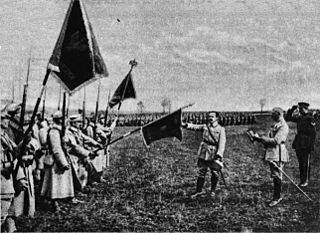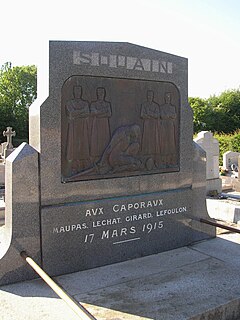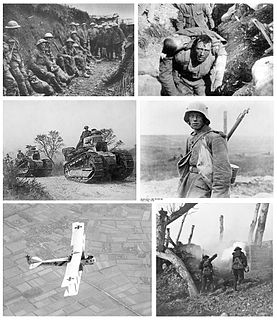 W
WThe military history of France encompasses an immense panorama of conflicts and struggles extending for more than 2,000 years across areas including modern France, Europe, and a variety of regions throughout the world.
 W
WThe Clemenceau–Lloyd George Agreement of 1 December 1918 was a verbal agreement which modified the 1916 Sykes–Picot Agreement in respect to Palestine and the Mosul Vilayet. The latter component is also known as the Mosul cession. The agreement was between British and French Prime Ministers David Lloyd George and Georges Clemenceau, and took place at the French Embassy in London.
 W
WThe Anglo-French Declaration was published by Great Britain and France, shortly after the Armistice of Mudros saw the capitulation of the Ottoman Empire. Some sources mention as publication date 7 November 1918, others 9 November 1918.
 W
WThe Argonnenbahn was a light railway in the Forest of Argonne in France, which was laid and operated by the German Army during the World War I.
 W
WIn France, the bleuet de France is the symbol of memory for, and solidarity with, veterans, victims of war, widows, and orphans, similar to the British Commonwealth remembrance poppy. The sale of "bleuet de France" badges on 11 November and 8 May is used to finance charitable works for those causes.
 W
WThe Blue Army, or Haller's Army, was a Polish military contingent created in France during the latter stages of World War I. The name came from the French-issued blue military uniforms worn by the soldiers. The symbolic term used to describe the troops was subsequently adopted by General Józef Haller von Hallenburg himself to represent all newly organized Polish Legions fighting in western Europe.
 W
WThe Committee of American Students of the School of Beaux-Arts, Paris was an organization of American art students at the Ecole des Beaux-Arts in Paris. American alumni of the school were also involved. It was active as a war and war-relief charity supporting the French cause during World War I, operating from at least 1916 through the end of the war. Among other activities, they raised funds through the production and sale of art-postcards.
 W
WThe Entente Cordiale was a series of agreements signed on 8 April 1904 between the United Kingdom and the French Republic which saw a significant improvement in Anglo-French relations. Beyond the immediate concerns of colonial expansion addressed by the agreement, the signing of the Entente Cordiale marked the end of almost a thousand years of intermittent conflict between the two states and their predecessors, and replaced the modus vivendi that had existed since the end of the Napoleonic Wars in 1815 with a more formal agreement. The Entente Cordiale was the culmination of the policy of Théophile Delcassé, France's foreign minister from 1898, who believed that a Franco-British understanding would give France some security against any German system of alliances in Western Europe. Credit for the success of the negotiation belongs chiefly to Paul Cambon, France's ambassador, and to the British foreign secretary Lord Lansdowne.
 W
WLa Ferté-sous-Jouarre is a commune in the Seine-et-Marne département in the Île-de-France region in north-central France.
 W
WThis is the order of battle for the French army on the outbreak of war in August 1914.
 W
WThe German occupation of north-east France refers to the period in which French territory, mostly along the Belgian and Luxembourgish border, was held under military occupation by the German Empire during World War I. Owing to the speed of the German invasion of Belgium in 1914, fighting reached French soil early in the war. Though their advance was stopped at the First Battle of the Marne in September 1914, the Germans gained control of a portion of French territory which remained under German occupation behind the stabilized Western Front for much of the rest of the war.
 W
WGueules cassées is a French expression for facially disfigured servicemen which originated in World War I. Colonel Yves Picot is said to have coined the term when he was refused entry to a gathering for the war-disabled.
 W
WHôpital Temporaire d'Arc-en-Barrois was an emergency evacuation hospital serving the French 3rd Army Corps during World War I. It was organised and staffed by British volunteers and served French soldiers.
 W
WThe heights of Le Mort Homme or Dead Man's Hill lie within the French municipality of Cumières-le-Mort-Homme around 10 km (6 mi) north-west of the city of Verdun in France. The hill became known during the Battle of Verdun during the First World War as the site of much fighting.
 W
WLes villages détruits are in northern France, mostly in the French département of Meuse.
 W
WThe Marne Medal was a French medal awarded to soldiers who had fought in the First Battle of the Marne, the Second Battle of the Marne or both engagements, particularly those who took part in fighting between 6 and 12 September 1914 on the Senlis front at Verdun.
 W
WParisians entered the First World War (1914-1918) in August 1914 on a wave of patriotic fervor, but within a few weeks Paris was close to the front lines and bombarded by German aircraft and artillery. The Parisians endured food shortages, rationing, and an epidemic of influenza, but morale remained high until near the end of the war. With the departure of young men to the front lines, women took a much greater place in the work force. The city also saw a large influx of immigrants who came to work in the defense factories. The end of the war on November 11, 1918 saw huge celebrations on the boulevards of Paris.
 W
WPlan XVII was the name of a "scheme of mobilization and concentration" that was adopted by the French Conseil Supérieur de la Guerre (the peacetime title of the French Grand Quartier Général from 1912 to 1914, to be put into effect by the French Army in the event of war between France and Germany. Though it was not "a prescribed narrative for the campaign" or battle plan, the deployment made possible a prompt invasion of Germany and/or Belgium before Germany could mobilise its reserves, simultaneous to a Russian invasion of East Prussia.
 W
WPoilu is an informal term for a French World War I infantryman, meaning, literally, hairy one. It is still widely used as a term of endearment for the French infantry of World War I. The word carries the sense of the infantryman's typically rustic, agricultural background. Beards and bushy moustaches were often worn. The poilu was particularly known for his love of pinard, his ration of cheap wine.
 W
WThe Sazonov–Paléologue Agreement was a 26 April 1916 letter from Russian Foreign minister Sergey Sazonov to French ambassador to Russia Maurice Paléologue regarding Western Armenia and the Anglo-French Sykes–Picot Agreement. The agreement for Russia influence over Western Armenia was given in return for Russian assent to the Sykes-Picot arrangement. The agreement took place on the first anniversary of the Treaty of London.
 W
WThe Scottish Women's Hospital at Royaumont was a medical hospital during World War I active from January 1915 to March 1919 operated by Scottish Women's Hospitals (SWH), under the direction of the French Red Cross and located at Royaumont Abbey. The Abbey is a former Cistercian abbey, located near Asnières-sur-Oise in Val-d'Oise, approximately 30 km north of Paris, France. The hospital was started by Dr Frances Ivens and founder of SWH, Dr Elsie Maud Inglis. It was especially noted for its performance treating soldiers involved in the Battle of the Somme.
 W
WThe Souain corporals affair was an incident where four corporals in the French Army were shot by firing squad as an example to the rest of their companies during the First World War. The executions, which occurred in the vicinity of Souain on 17 March 1915, are considered to be the most egregious and most publicized military injustice during World War I in France. The events inspired the 1935 anti-war novel Paths of Glory by Humphrey Cobb, later adapted for film by Stanley Kubrick.
 W
WThe Sykes–Picot Agreement was a 1916 secret treaty between the United Kingdom and France, with assent from the Russian Empire and the Kingdom of Italy, to define their mutually agreed spheres of influence and control in an eventual partition of the Ottoman Empire.
 W
WThe Triple Entente describes the informal understanding between the Russian Empire, the French Third Republic and Great Britain. It built upon the Franco-Russian Alliance of 1894, the Entente Cordiale of 1904 between Paris and London, and the Anglo-Russian Entente of 1907. It formed a powerful counterweight to the Triple Alliance of Germany, Austria-Hungary, and Italy. The Triple Entente, unlike the Triple Alliance or the Franco-Russian Alliance itself, was not an alliance of mutual defense.
 W
WA Very Long Engagement is a 2004 French romantic war film, co-written and directed by Jean-Pierre Jeunet and starring Audrey Tautou. It is a fictional tale about a young woman's desperate search for her fiancé who might have been killed during World War I. It was based on the 1991 novel of the same name by Sébastien Japrisot.
 W
WThe Western Front was the main theatre of war during the First World War. Following the outbreak of war in August 1914, the German Army opened the Western Front by invading Luxembourg and Belgium, then gaining military control of important industrial regions in France. The German advance was halted with the Battle of the Marne. Following the Race to the Sea, both sides dug in along a meandering line of fortified trenches, stretching from the North Sea to the Swiss frontier with France, which changed little except during early 1917 and in 1918.
 W
W W
W W
W W
W W
W W
W W
W W
W W
W W
W W
W W
W W
W W
W W
W W
W W
W W
W W
W W
W W
W W
W W
W W
W W
W W
W W
W W
W W
W W
W